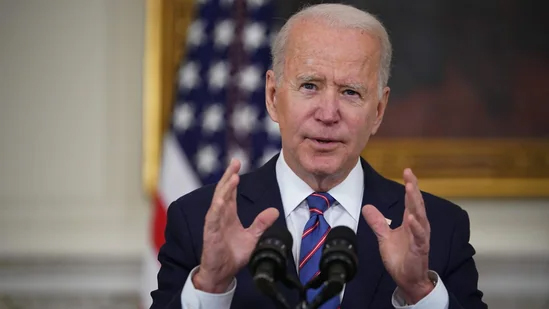Indian officials are in touch with their counterparts in the US to resolve a hold-up in supplies of raw materials needed by Covid-19 vaccine makers that has been caused by Washington’s decision to prioritise local buyers under a war-time law invoked earlier this year by President Joe Biden to boost vaccine production.
Supplies of nearly 30 such items have been affected by this wartime law, known as the Defense Priorities and Allocations System Programme (DPAS) under the Defense Production Act (DPA).
Vaccine maker Serum Institute of India (SII) is understood to be in dire need of raw materials as it ramps up its production of Covid-19 vaccines amid an alarming surge in infections across the country.
These raw materials include reagents, tubing materials, nano-filters, plastic bagging material and equipment that are understood to be needed for ramping up vaccine production.
The Indian side has raised the issue with the US as part of the growing bilateral cooperation on healthcare. External affairs minister S Jaishankar discussed it with US secretary of State Antony Blinken on Monday, and the Indian Ambassador to the US, Taranjit Singh Sandhu, has brought it up in his conversations with US officials.
The Americans have promised to “give the matter due consideration” and work with India to “find appropriate solutions”, according to people familiar with the developments.
The raw materials are not subject to any explicit export ban, it has been argued. But American sellers of these items are obligated to meet contractual requirement from US buyers before anyone else, which include Indian buyers, who have been being told to expect delayed delivery, according to the people familiar with these discussions.
Biden invoked the DPA in February to boost vaccine production, especially to aid Pfizer-BioNTech’s effort.
The supply crunch for Indian vaccine makers was first noticed in March, according to the people cited above. SII’s CEO and owner Adar Poonawalla went public with his plight in an appeal to Biden last week.
Now that the US has administered at least one dose of vaccine to half of its population and built up a sizable stockpile of millions of doses, its need for these raw materials may be tapering off, which would allow American suppliers to resume full and timely delivery of shipment ordered by outside buyers, such as vaccine makers from India, it was said.
The issue of raw material supply crunch has, however, been confused in some quarters for India and South Africa’s appeal to the World Trade Organization (WTO) last October for a temporary waiver of intellectual property rights (IPR) related to Covid-19 vaccines and treatments, “until widespread vaccination is in place globally, and the majority of the world’s population has developed immunity”.
The US and Europe, home to leading Covid-19 vaccines makers, have blocked that move, which has been backed by 80 WTO members.
Asked about the bottleneck in raw material supplies, Jen Psaki, the White House press secretary, spoke on Monday about the WTO discussions. “We are, of course, working with WTO members on a global response to Covid. That includes a number of components, whether it’s $4billion committed to COVAX, or discussions about how we can aid and assist countries that need help the most,” she said.
Psaki also referred to US trade representatives Katherine Tai’s speech at a WTO-hosted discussion on Covid-19 vaccine and the need for their equitable distribution around the world.
While sympathetic to the cause, Tai did not concede any ground on the question of the waiver of Covid-19 vaccine-related IPR.

